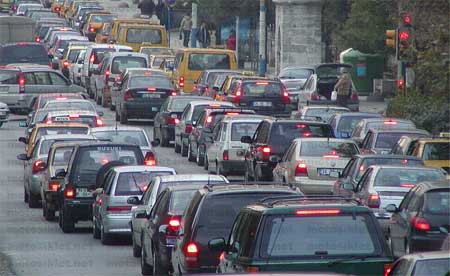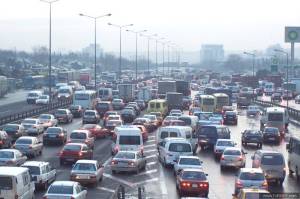
One of the usual options when planning to travel to a foreign country is driving our own car or rent one at the destination. In Turkey is not very common and there are two problems, dangerous traffic and the highest fuel prices in the world.
Fuel is a major source of revenue for the Turkish state and the country is at the top of the list when it comes to the price of petrol and diesel. Currently, the price is around 1,95 € petrol and 1.73 € diesel.
 Personally, after almost four years living in the country, I would recommend using public transportation or taxis, fairly cheap and available everywhere. In addition, the car accident rate is very high in Turkey. If we consider the number of victims per 100.000 vehicles, it is almost ten times higher than in Spain. Turkish authorities have launched road safety campaigns to promote the safety belt utilization, wearing helmet on motorcycles, etc., but social awareness is not yet perceptible on this issue.
Personally, after almost four years living in the country, I would recommend using public transportation or taxis, fairly cheap and available everywhere. In addition, the car accident rate is very high in Turkey. If we consider the number of victims per 100.000 vehicles, it is almost ten times higher than in Spain. Turkish authorities have launched road safety campaigns to promote the safety belt utilization, wearing helmet on motorcycles, etc., but social awareness is not yet perceptible on this issue.
Much can be said about the Turkish traffic but in the end we have to stay with the idea that it is dangerous. Roads have improved a lot but the paths, access ways and crossovers are far from the safest. In recent years, obsolete cars are fast disappearing from the main cities but, generally, many drivers continue to behave with the same recklessness and little regard for others. Finally, pedestrians do not show to be worried about their own safety and they appear anywhere. If we decide to drive in Turkey we must always be focused, drive at a speed that allows us to react to unexpected situations and never imitate the aggressive driving they practice.
 Visitors can use their permits to drive in Turkey for three months. If the document issued by our country does not include a photo, then an international driving license is required. For longer stays or residents, international driving lincese permission is needed or we can also exchange our license for a Turkish one.
Visitors can use their permits to drive in Turkey for three months. If the document issued by our country does not include a photo, then an international driving license is required. For longer stays or residents, international driving lincese permission is needed or we can also exchange our license for a Turkish one.
You can enter Turkey driving our own vehicle or rent a car. Rental prices are not expensive and can be booked in advance online or even go to the agencies desk at airports and in all major cities. At the end of the post I have included the documentation to come in with your own car.
In case of accident you should not move the vehicle and always you have to call the police to raise a statement. Our foreigner condition is not helpful in these cases and we must be sure we understand all documents we sign. Therefore, we should not economize on insurance coverages, either you drive a rental car or it is your own, because it is very likely that we end up being declared responsible for the accident. If the car is a rental one, it is recommended to clarify with the agency the steps to be taken in case of an accident. Telephones of interest: Traffic Policy (Traffic Police), Tel. 154 and Gendarmerie (Gendarme), Tel 156.
To enter our vehicle in Turkey we need to submit the following documents:
- Passport
- Driving license
- Vehicle Logbook
- Green Card International (insurance card) where TR sign should be visible
- Sheet Transit carnet de passage (for those who want to continue with him to the Middle East)
- If the vehicle belongs to another person, power of attorney with apostille and Turkish translation.
Before going to Turkey with our vehicle it is recommendable to contact the consulate to ensure the updated procedures.
The vehicle may remain in Turkey maximum 6 months. The owner must state the exit date and customs point, being mandatory to the country at the announced point and date. If due to any important reason the staying period has to be extended, it is necessary to apply to the following address before the end of the stated period.
- Touring and Automobile Club of Turkey (Türkiye Turing Kurumu Otomobil ve)
1. Sanayi Sitesi Yani, 4.Levent, Istanbul
Tel. (212) 282 81 40 (7 lines), fax (212) 282 80
- Customs General Directorate (Gümrükler Genel Müdürlügü)
Ulus – Ankara
Tel. (312) 310 38 80, 310 38 18, fax (312) 311 13 46
A detail of the utmost importance is that highways and bridges tolls can not be paid in cash. It is necessary to wear an electronic device called HGS (Hızlı Geçiş Sistemi), because otherwise we risk a heavy fine. When we enter the country, ask at the customs office where the closest place to get it is. All Post Offices (PTT) and also in most banks they will register us in the system and give us a sticker for the windshield. If the car is a rental one, do not forget to ask for the device at the agency.

Despite all this, you can rent a car and make very many routes interesantes.Lo unique is that you should never trust the next and roundabouts, wait to see who makes entering the roundabout, because generally, not for.
We are one of the crazies who have dared to bring your car to Turkey.
In fact we come from the port of Igoumenitsa in Greece, where a highway that runs across the border with Greece to Turkey begins. This modest but motorway services is in very good condition and is amazing for the amount of tunnels that cross and scenery that you'll find. Along the way we saw the monasteries of Meteora and Thessaloniki Archaeological Museum which has a stunning collection of Greek jewelry.
While driving in Greece is “informal”, to move to Turkey should exercise caution. Are unfolding almost the entire road network, except that the “highways” Turkish in most of its crosses have level crossings with a small central roundabout and signage is poor, as cuando passed three of the lanes.
The entrance to Istanbul is a mess. It is reached by a highway with automatic tolls only work with teletac, but do not worry you do not have gates, just whistle. Maybe make me pay a fine when we leave Turkey. On leaving the motorway you run a giant jam from where you can see huge new suburbs being built around Istanbul. With the indispensable help of a GPS we were able to guide us to reach our hotel in Beyoglu, a labyrinth of steep streets and crowded stores, Nightlife, of hammams sordid, the modern face of Istanbul.
Finally we reached our destination and left our car in the car park sleeping depues haggling the fee for full day.
Absolutely recommend using the ferries to exit (enter the) Istanbul. The roads are fluid between the ports and the ferry service is excellent. We were impressed by the efficiency and modernity of doing Yenikapi ferry route – Bandirma, across the sea of Marmaris, loading and unloading the ship takes half an hour.
Theoretically tickets can be purchased online at http://www.ido.com.tr/en, but the website does not work well (recommended Explorer) and after trying four different cards we had to book by phone (English). With patience and after a while, we get.
A hug from Turkey.
As you have been found, signaling is scarce and is another reason why you need to move at a slower speed, otherwise we had signals. A comment on the GPS, even the latest maps Turkish versions often have serious mistakes as sales of large cities. For some strange reason, tend to get you on back roads. I finished on dirt roads more than once because of the GPS. Before starting a long route, should you study the itinerary to reject the GPS directions to divert you from the main roads.